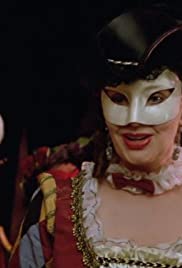
THE AFFAIR AT THE VICTORY BALL
UK, 1991, 50 minutes, Colour.
David Suchet, Hugh Fraser, Philip Jackson, Pauline Moran, Mark Crowdy, David Henry, Haydn Gwynne, Nathaniel Parker, Natalie Slater, Kate Harper, Andrew Burt.
Directed by Renny Rye.
This is one of the many short stories by Agatha Christie, a satisfactory murder mystery, part of the television series with David Suchet as Poirot.
The film has some exotic background with the characters from Italian traditions, Harlequin, peer and the others, with the visualising of statues and costumes. And, with adults in the costumes participating in the Victory Ball. And the ball itself is quite a lavish and colourful affair, many participants, fancy dress, the orchestra playing, dancing and, finally, masks off.
There is also a BBC background, a radio play with some of the characters actors in the play.
Poirot did not want to go to the ball, preferring to stay home organising his stamps, but Hastings, in 18th century costume, tells him that the BBC manager would find meeting him a highlight. Poirot goes.
One of the group, Viscount, is found murdered. There is a variety of suspects, of course. His cousin, needing money to buy china and statuettes succeeds him as Viscount. There is an American visitor, loud, looking for someone to marry, and money. There is the main actress who is found dead in her bed. There is a couple, he an actor at the BBC, she rather timid. Given the limited number of suspects, it is not too difficult to work out who the murderer might be.
The film uses the device of Poirot going on the BBC and solving the mystery on air, the suspects all present. He explains the situation, the murderer denies guilt, is found to be the supplier of cocaine for the actress, fabricates an alibi – and his caught out by catching one of the statues, thrown by Poirot, with his left hand but in his disguise, he is seen writing and waving with his right hand.
And there is a very good joke at the end with Poirot, pleased with himself, the switchboard crowded with calls – all criticising his English pronunciation!
1. The popularity of Agatha Christie mysteries? The television series with David Suchet as Poirot?
2. The London story? Poirot and is home and office? The presence of Hastings, the work of Miss Lemmon? Poirot and his stamps? The invitation to the ball, his reluctance, the flattery of meeting him as a highlight?
3. The Harlequin settings? The statuettes? The naming of each of the characters and their role? The Italian tradition? The friends and their dressing in the costumes? Participation in the ball?
4. The BBC, the building, the studios, the radio play, Coco and her arriving late? And then getting ready for the ball? The Viscount, the discussions with Ernest, his wanting money, his interest in china and statuettes? The Davidsons, the actor, the timid wife? Mrs Mallaby, the loud American? Widow? On the make?
5. Poirot and Hastings, the BBC producer, his welcome? Poirot enjoying the ball? Mrs Mallaby wanting to dance, Poirot nominating Hastings, her seeing the Viscount and calling to him? The importance of the timing, the costume, his writing the note?
6. The lavish ball, the range of people present, the range of the costumes, the dancing?
7. The atmosphere, Coco and her behaviour, Davidson taking her home, his wife remaining, overhearing the discussions about money? The importance of the timing?
8. The issue of cocaine, the container, Coco and her addiction, the mystery of her supplier, the argument with the Viscount, the suspicion that he was her supplier? Davidson taking her home, her going to bed, being discovered dead?
9. The discovery of the Viscount’s body, the knife? The autopsy, his clenched fist, the green pom-pom, the speculation as to where it came from?
10. The interrogations, suspicions? The invitation to Poirot to go on the BBC, his former reluctance? His sitting at the microphone, Hastings present, Miss Lemon and listening on the radio, the suspects all present?
11. The device of explaining the mystery, Poirot speaking, the lies, especially Davidson’s wife and the visit to the house, the costumes in the cupboard? Mrs Mallaby her witness? The older man becoming Viscount – and the visit to his house, the statuettes? Poirot explaining the characters and their characteristics? Mrs Davidson and the covering for her husband? Poirot accusing him, his alibi is, but his taking Coco, the drugs, supplying, killing her, his having killed the Viscount and hidden the body? The clutching at the pom-pom, the extra costume? Poirot throwing the statue – and his catching it with his left hand? Having been seen writing the note and waving with his right hand?
12. The presence of Chief Inspector Japp, collaboration with the investigation? His presence at the BBC?
13. The jokey ending, the switchboard full of calls, Poirot pleased, their all criticising his English pronunciation, Japp and his mention of lingo, and Poirot offering to send him his book on how English should be spoken?